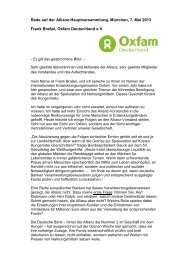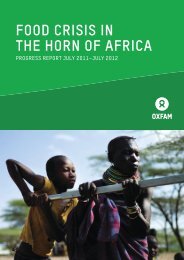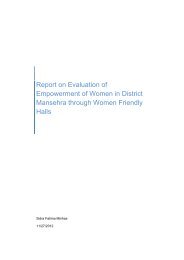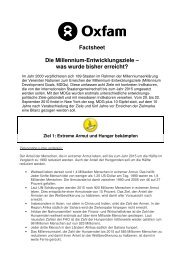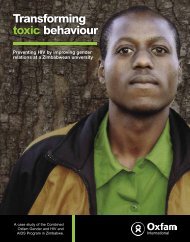No Time to Lose - Oxfam
No Time to Lose - Oxfam
No Time to Lose - Oxfam
Create successful ePaper yourself
Turn your PDF publications into a flip-book with our unique Google optimized e-Paper software.
Summary<br />
By 2014, the Afghan national army and police – under the authority of<br />
the Ministries of Defence and Interior, respectively – are expected <strong>to</strong><br />
assume full responsibility for the protection of Afghan civilians. But<br />
as international military ac<strong>to</strong>rs prepare for withdrawal, there are serious<br />
concerns regarding the professionalism and accountability of the<br />
security forces they will leave behind.<br />
The civilian <strong>to</strong>ll of the conflict in Afghanistan is getting worse each<br />
year. In 2010 at least 2,777 civilians were killed – the highest since<br />
2001. Armed opposition groups continue <strong>to</strong> account for the highest<br />
number of civilian casualties and the most serious violations of human<br />
rights and humanitarian law; but the Afghan National Security<br />
Forces (ANSF) – financed, trained and equipped by the international<br />
community – also account for substantial civilian harm. At least 10<br />
per cent of Afghan civilians killed in the conflict in 2010 were killed by<br />
their own security forces.<br />
But civilian casualty statistics do not convey the full extent of harm<br />
caused <strong>to</strong> the civilian population by the ANSF. Human rights organisations<br />
have documented a series of alleged violations of human<br />
rights and humanitarian law on the part of the national security<br />
forces, including night raids carried out without adequate precautions<br />
<strong>to</strong> protect civilians, the recruitment and sexual abuse of children, mistreatment<br />
during detention, and the killing and abuse of civilians by<br />
local police seen by many communities as criminal gangs.<br />
The international community has been pouring money in<strong>to</strong> the war in<br />
Afghanistan for almost a decade, but serious efforts <strong>to</strong> strengthen the<br />
professionalism and accountability of the national security forces only<br />
really began in 2009. For the best part of a decade there has been a<br />
striking lack of attention <strong>to</strong> the development of qualified security personnel,<br />
and equally, a lack of attention <strong>to</strong> the institutional reform necessary<br />
<strong>to</strong> ensure accountability. There is no satisfac<strong>to</strong>ry mechanism<br />
by which an individual can lodge a complaint against the ANSF; nor<br />
for the processing of complaints; nor for the dissemination of findings<br />
or the payment of compensation. The military justice system functions<br />
only for those without political connections, there is no permanent<br />
institution devoted <strong>to</strong> investigating allegations of harm caused<br />
by the ANSF, and civilian casualties caused by the ANSF are not even<br />
counted by the government. As greater responsibility is handed over<br />
<strong>to</strong> the national security forces, there is a serious risk that unless adequate<br />
accountability mechanisms are put in place, violations of human<br />
rights and humanitarian law may escalate – and Afghan civilians<br />
will pay the price.<br />
2




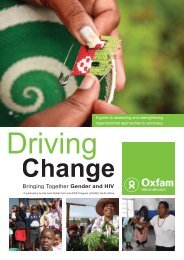

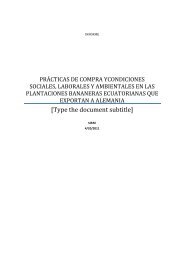
![Download: Faltposter EU-Handelspolitik [PDF 2,17MB] - Germanwatch](https://img.yumpu.com/25095854/1/190x161/download-faltposter-eu-handelspolitik-pdf-217mb-germanwatch.jpg?quality=85)
